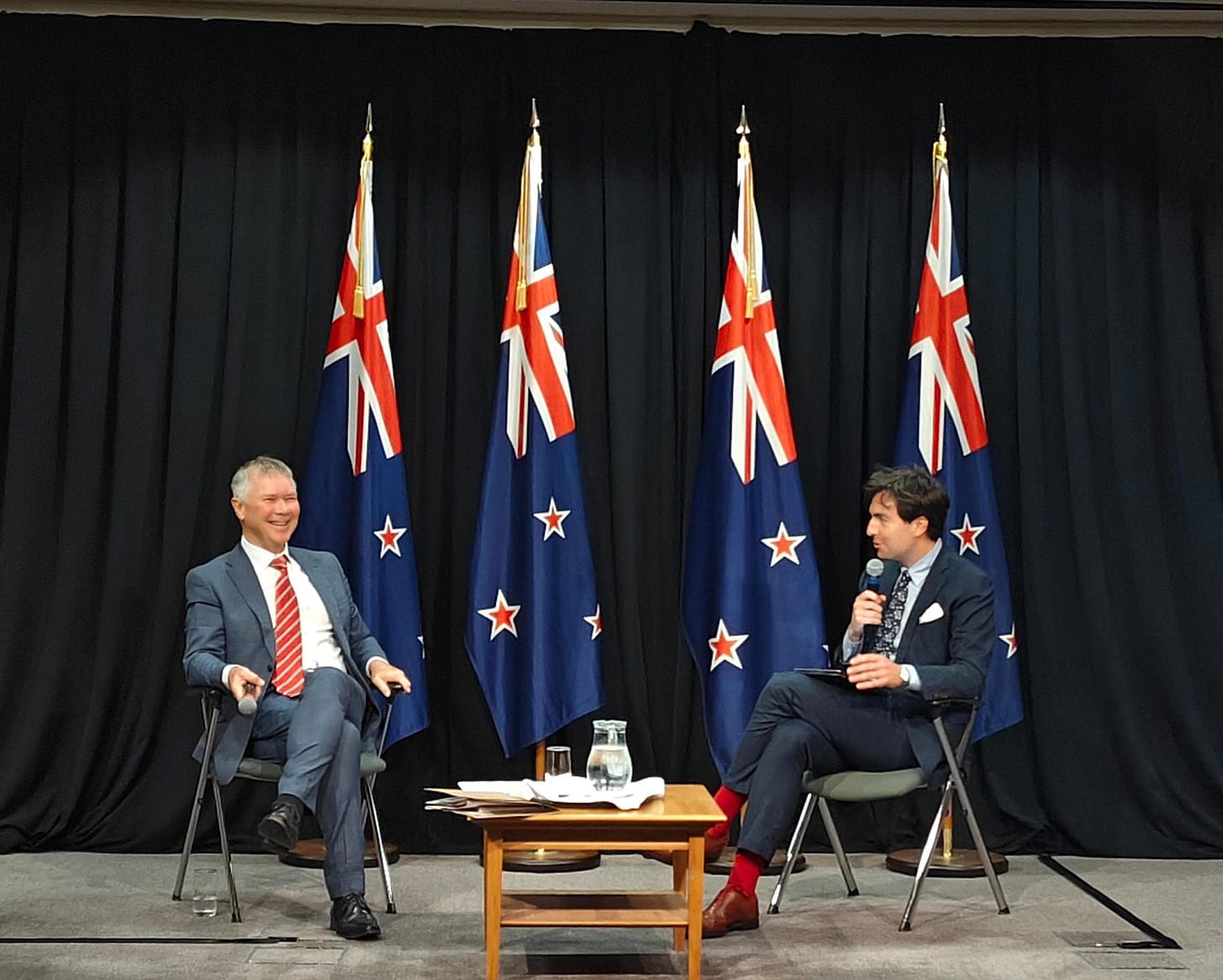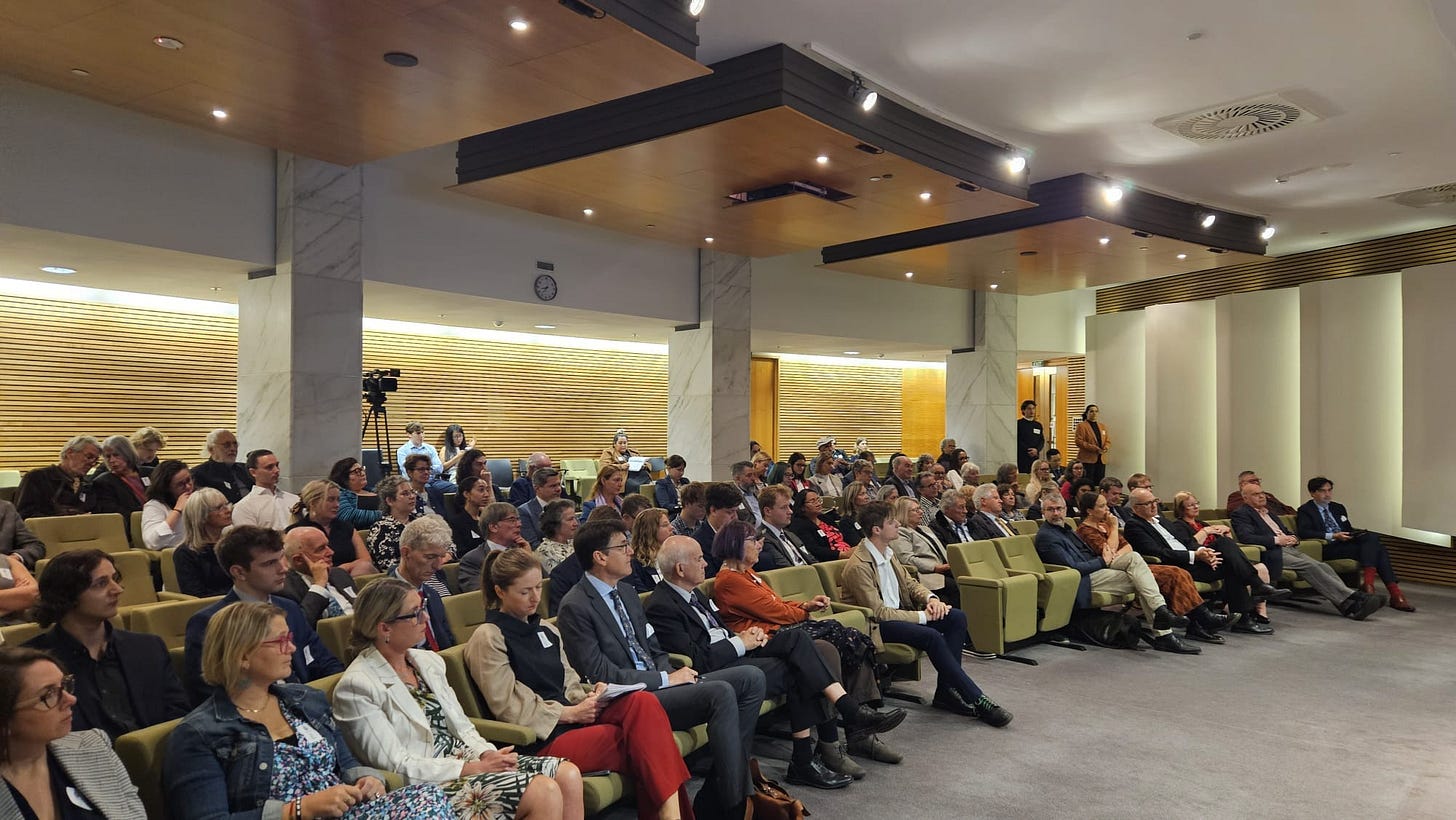We are Internationalists, not Isolationists
Labour's David Parker reflects on the rapidly changing world, underlying drivers for change, and how Labour would return to a more evenhanded foreign policy
Diplosphere hosted Hon David Parker, Labour spokesperson on Foreign Affairs at Parliament on March 27 in front of a full audience. Proceedings had a French flair with Diplosphere ED Maty Nikkhou-O’Brien Zooming in from Paris, while NZ Herald’s Deputy Political Editor Thomas Coughlan marshalled Q&A matters on the ground. A full house Beehive Theatrette was buzzing with over a hundred guests mixing and mingling before the talk. Full recording available to Diplosphere members here.
Some Diplosphere takes -
(1) An Advocate for Evenhandedness - Parker reflected on the rapid, deep changes in relationships between nations, especially those that were once thought as close partners, such as Canada and the United States. The US is now walking away from the very institutions that it was instrumental in setting up. Institutions which have underpinned international law and served small liberal democracies like New Zealand well. Parker suggests NZ should recommit to these international institutions rather than be subservient to a might means right view. Parker wants a return to an evenhanded yet “clear eyed” foreign policy. The language of the talk reflected that - he eschewed the reductive phraseology of national security: strategic competition, contests, bad actors, and threat (prevalent in the charmed Wellington circles of high officials, and adopted by some in NZ media, think tanks, and academia).
the New Zealand government has spent the last 18 months seeking closer alignment to the US, increasingly positioning New Zealand as being in opposition to China. We did not consider this a wise approach, but in any case the shifting global landscape has rendered it unsound.
Why did Luxon antagonise in China, while in India recently by describing a “binary choice” between India and China? Parker described this as clumsy. It is a misread. New Zealand is being hypocritical in only pointing the finger at China without acknowledging superpowers’ past and present own assertiveness - in our region, and beyond - like the Middle East.

How should New Zealand navigate the new order? When should we speak out When should we stay silent so as not to provoke a response?
-Hon David Parker mused @ Diplosphere with Thomas Coughlan, NZ Herald
(2) All Foreign Policy Starts at Home - Parker elaborated on two underlying problems driving much of the malaise in liberal democracies. Globalisation has failed the median worker. Real wages are down. Middle classes are suffering especially in the United States. This discontent is manifested in Trump’s second reelection there. He recollected dealing and sympathising with US Trade Representative Robert Lighthizer (under Trump’s first term as US president) - who berated the role of private equity in eviscerating the standard of living of the average American manufacturing worker. In addition, the influence of tech platforms in whipping up discontent based on false information was also critiqued. On this, Parker proposes a legal solution - reversing the immunity for liability for content on those platforms, granted in the early days of the internet, when providers were treated like the post, not responsible for the content of their “letters”. Clearly they are more than anodyne digital post offices today. They are global digital media platforms with enormous influence. They should be constrained as the mainstream media is in this regard. However as noted by a questioner in the Q&A though, it is quite unclear how this could have practical effect without a sufficient coalition of willing nations with clout to tether the tech titans. (Counterpoints: who would be the gatekeepers be? Has the Murdoch media been any better (ex: Iraq War in 2003)? Social media also provides alternative voices and channels for independent outlets, like Substack!)
(3) Play to Our Strengths - Parker proposes that Aotearoa New Zealand returns to an independent foreign policy. He wants a renewed focus on international law, building trusted relationships with like-minded countries, and a focus on as much on “soft power” as hard power. That is, an approach which values diplomacy and development as much as hard military power; an approach that while not isolationist or non-aligned, acts on principles, and balances our relationships with major powers. Little detail was provided on the proposed Pacific Peace Zone. And though mentioned once, his talk did not speak much of the Pacific Islands’ primary challenge - adapting to a changing climate - as repeatedly communicated by the Pacific Island Forum.
Keating’s purpose was to emphasise that we shouldn’t be subservient, nor cede moral authority, to others including the US when choosing our approach to the world.
(4) Parker Lambasts Government on Gaza and AUKUS - Parker sees good in the government’s approach in some issues: the support of Ukraine against Russian aggression, the concern regarding the lack of consultation with NZ over the Cooks China deal, and the militarisation of the Pacific. However, he delineated strong differences on issues too: support for international law (or lack thereof), and AUKUS Pillar 2. The weak support for the International Court of Justice (the UN’s court), and the International Criminal Court (ICC) were two examples given. Parker decried the fact the New Zealand did not join Switzerland, the UK, France and others in a recent motion of support for the ICC after the United States sanctioned officials there - their action is in support of Israel. On AUKUS, Parker reminds us that the US has described this as a China containment strategy - which offers NZ lots of downside with little upside. Certainly New Zealand risks landing on the wrong side with China after decades of building trust with that country.
But the government’s seeming unwillingness to criticise anything pertaining to the US concerns us, even when the US went so far as to sanction others for participating in international institutions we support.
For example, New Zealand is a member of the International Criminal Court. The US is not. That is their right, but for the US to sanction those assisting the ICC is wrong.
(5) Return to a tradition of independent foreign policy - Parker pointed out how PMs past can speak freely. That on both sides of the Tasman, and on opposite benches in their respective Houses, these have spoken with concern about the current trajectory of foreign policy which seeks greater alignment with Washington, at the expense of Beijing.
New Zealand needs a clear-eyed vision for courteous relations with the US and China, close dialogue with the Pacific Rim, Pacific Island and European friends.
Everyone in this room has a role to play. It has never been more important to stand up for New Zealand’s independent foreign policy. And we all should.
Clearly Parker has given much thought and time to this speech.
One does wonder how that charmed circle in Wellington of high officials have not had the foresight to plan for the rapidly changing hybrid interconnected multi-polar world of 2025? Surely the writing was on the wall for anyone looking, or at least to plan for. Why would you take sides and “align”, for what gain? Is there a systemic problem with the advice being given to government? The strategy MFAT, National Security, and MoD strategy documents published recently will certainly need an update!
Diplosphere will publish a recording of the event for subscribers soon (Parker’s remarks can be found here)






I like your closing statement. I couldn’t attend the session being based in Hokitika these days and while I’m pleased Parker is signaling a desire for an independent foreign policy, the fact that Labour recently appeared to have abandoned that without notice makes me dubious of trusting them in the immediate future. That plus his view on Ukraine is disappointing. Doesn’t he recognise that there too has been a civil war for a long time now and foreign powers such as the US have played a major role in the current situation?